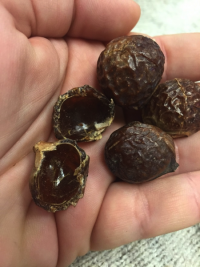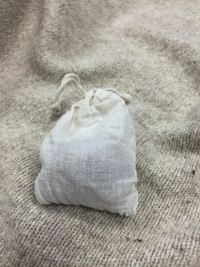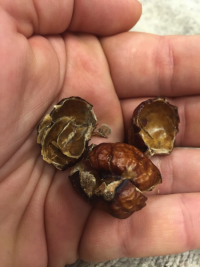
Don’t Throw Your Health and Virility out With the Wash Water
- Is this everyday task harming your reproductive organs and slowly reducing your virility?
- Wait… that man fish is now part lady fish? Yep. Find out why.
- Two natural solutions to help combat hormone disrupting chores.
A couple weeks ago, Jasmine LeMaster, chief of quality assurance here at Living Well Daily, and I were talking about the GMO Shopping Guide she’s diligently working on.
As we skimmed through different topics we’ve researched so far, household cleaning products came up.
Unfortunately, many cleaning products contain dangerous chemicals and toxic ingredients.
And since I haven’t exactly been shy about voicing my distaste for chemicals around the health quarters, she asked me for some suggestions. I will share a few of these suggestions for a specific chore in bit.
As our conversation went on, it became pretty obvious one common chore stood out from the rest as possibly being the most lethal. And it may surprise you.
On average, most of us do this chemical-laced task about eight times a week.
Actually, it’s so common, I’ve already done it today.
But what makes it more alarming — the dangers don’t end with completion of the chore.
The chemicals used stay in our environments and penetrate the fabrics our families wear, sleep on, and even dry our dishes with.
And what is worse, these chemicals are absorbed into our bodies through the nose, mouth, and skin. Skin is the largest and most exposed organ of your body, thus making exposures completely unavoidable.
And believe me, these chemicals are nothing to mess with — endocrine disruptors (also called “gender-bending” chemicals).
They are associated with some pretty terrifying health endpoints. In today’s issue, we will wash out what keeping clean sheets means for you.
Plus, a few tips on how to reduce their quantities in your home.
First, let’s uncover what this necessary chore is and how its products may already be affecting your body.
Dangerous Suds
Laundry is the health-ruining chore Jasmine and I were discussing — and not just because it can be time-consuming and annoying.
Laundry detergents and fabric softeners are full of synthetic chemicals, fragrances, and additives. Some of these can cause all sorts of negative health impacts on you and your family.
There are many chemical offenders in these products. I am going to highlight one of the most dangerous today. (Stay tuned to Living Well Daily for a full list of chemicals to avoid in the upcoming GMO Shopping Guide.)
Let’s get started…
The origins of health-hazardous petrochemical laundry soaps began during World War II. As fats and oils were made into explosives instead of cleaning products, scientists figured out how to turn petroleum into synthetic soaps, resulting in the creation of laundry detergent.1
One of the largest groups of sudsy offenders are nonylphenol ethoxylates (NPEs). These health and environment destroyers of the synthetic detergent world are currently banned in the European Union and Canada due to their endocrine-disrupting properties and environmental consequences.
However, here in America, we use anywhere between 270-370 million pounds of NPEs annually.2
While NPEs are allegedly biodegradable, they take a long time to break down in the environment and often turn into health-harmful chemicals during the degradation process.
Some of these chemicals cause endocrine disruption. Because endocrine disruptors mimic estrogen hormones, exposures can lead to reproductive issues, hence their nickname — “gender-bending” chemicals.
If NPE breakdown chemicals are absorbed into the body (through the skin, mouth, or lungs), the body cannot distinguish between the synthetic substance and actual estrogen.
Doing laundry with these also releases them into local watersheds, where they wreak havoc on aquatic creatures.
In fact, male rainbow trout exposed to NPEs in a lab setting become part male and part female. This is true in winter flounder, oysters, and salmon as well. Exposure can also lead to decreases in testicular growth, lower sperm counts, and damage to the kidneys and livers for fish.1
Yikes!
As terrifying as it is to hear NPEs are reproductively altering some of our aquatic brethren (and part of on our food chain), it’s even more disturbing to hear what it’s doing to mammals — specifically humans.
One study showed NPEs cause changes in the human placentas. These changes may result in fetal defects or early pregnancy termination.3
But the dangers don’t stop there.
While there haven’t been any studies on male humans, it makes one curious if the same symptoms found in fish translate, in some form, to men.
Research on other endocrine disruptors have found exposure to environmental estrogens may lead to infertility, prostate cancers, and testicular dysgenesis syndrome. 4
Furthermore, high levels of estrogen in men can increase breast tissue growth and lead to erectile impotence.5
Are those “mountain fresh” scented sheets really worth all those health effects?
Probably not.
While the jury is out on the official health effects of NPEs and their breakdown forms in human, it’s likely safest to avoid them.
And no, this doesn’t mean you have to go without washing your clothes.
Break Free of NPEs
I haven’t used standard laundry detergent in many years.
And as it turns out, Jasmine hasn’t either.
However, we still have very clean clothes. Though we use different cleaning methods — I will share them both in a moment.
And the best part? They aren’t laced with gender-bending chemicals.
While many store-bought product tout they are safe and biodegradable, they still may contain NPEs or other endocrine disruptors.
And even if they are truly free of NPEs, they may still contain health-damaging synthetics.
It’s very important to read your labels in the laundry aisle to see exactly what is in your detergents. If there is something you aren’t familiar with, look it up and find out what kind of health impact it may have on you.
Or do what we do here at Living Well Daily and avoid it.
Here is what we do instead…
The Natalie Method:
I use 1/8 cup of Dr. Bronner’s Castile Soap in the detergent drawer and 1 cup of baking soda in the load. I have an HE machine, so I don’t have to use a lot of Dr. Bronner’s. If you have a standard machine, use ¼-1/2 cup instead. This is my recommendation for a full load. Adjust quantity for load size.
Dr. Bronner’s is synthetic free and a very strong soap. The liquid form is available in a variety of essential oil-based fragrances. I use the lavender, and it really makes my clothes smell nice. The addition of baking soda helps with odor control as well as softening clothes.
You can buy Dr. Bronner’s here.
The Jasmine Method:
Jasmine uses soap nuts.
Soap what?
That is exactly what I said when she told me her laundry method.
Soap nuts, also called soap berries, are a natural fruit that comes from trees. Their husks contain saponin. Saponin creates a soaping effect. The husks are dried and then used as laundry cleaner.
After she told me about them, I became very curious. So I ordered some.
I was really impressed with how well they worked. My clothes were very clean and had a very faint fresh smell that is natural to the berry.
All you have to do is add three-five soap nuts to a muslin bag and toss in the wash!

Unused soap nuts ready to go in the wash bag.
New soap nuts will look like the ones above. You can see the shiny saponin inside.

Soap nuts in a bag ready to do their magic in the wash.
The bagged soap nuts go directly into the load. The bag and nuts need to dry if you aren’t doing consecutive loads. You can just take them out and place them on top of your washing machine. It’s not an issue if they accidentally end up in the dryer.

These soap nuts are past their prime.
The soap nuts above have made it through five wash cycles. It is time to replace them. Once they start to loose shape and inside luster, it’s time to get some new ones in your wash!
You can buy soap nuts here. There are liquid alternatives if you don’t think the nuts are a good fit for you. The liquids can replace all types of household cleansers, as well.
Laundry dangers don’t stop at the washer. Dryer sheets may be the worst toxin in your cleaning cabinets. We will dig into them and some healthy alternatives in an upcoming article, so stay tuned!
If you have any healthy laundry hacks, write me!: nmoore@lfb.org
Live well,

Natalie Moore
Managing editor, Living Well Daily
Sources
[1] Do You Know What’s in Your Laundry Detergent?
[2] Nonylphenol (NP) and Nonylphenol Ethoxylates (NPEs)
Action Plan
[4] The Effect of Environmental Estrogens on Men’s Health
[5] Signs and Symptoms of High Estrogen
Written By Natalie Moore
Natalie Moore is a dedicated health researcher with a passion for finding healthy, natural, and science-based solutions. After a decade of direct healthcare experience in western and natural medicine, she was involved in public health research before joining Living Well Daily.
View More Free Articles
The Secret Ingredient to a Longer, Happier Life
Let’s face it. We’re all in need of an attitude adjustment from time to time. After all, when you turn on the news these days, the world can seem pretty dark. That is unless you make it a practice to look for the silver linings. In fact, Harvard researchers say when you do, something quite...
Do You REALLY Need All Those Skincare Products?
I often get questions about skincare products—and here’s what I’ve learned. In today’s beauty-obsessed world, it’s easy to fall into the trap of spending hundreds every month believing you need countless products to fight aging and achieve healthy, glowing skin. However, many dermatologists argue that LESS is MORE when it comes to skincare. Simplifying your...
“Ebb and Flow” Technique TRANSFORMS Senior Brain Health
You know by now that exercise is good for you. It keeps your heart healthy, your muscles strong, and your waistline trim. But what if I told you that a trendy “ebb and flow” workout technique—often associated with young fitness enthusiasts—could actually be a game-changer for us “oldsters” when it comes to brain health? And...
Mailbag: Slash Your Risk of Bone Fractures as You Age
“My doctor recently told me that I have osteoporosis. What can I do to reduce my risk of fractures and maintain strong bones as I age?” – Margaret Hi Margaret, Sorry to hear about your diagnosis. I’m sure it was a shock. Osteoporosis is a serious condition that affects millions of people, and it’s not...
Household Favorite EXPOSED as Cancer Risk?
We all want to believe that the products we use daily are safe. After all, if they weren’t, they wouldn’t be on store shelves, right? Well, I hate to break it to you, but sometimes, the truth is far more alarming than we’d like to admit. The World Health Organization (WHO) has just dropped a...
Hidden Heatwave Threat REVEALED
Heat waves can have serious consequences. After all, staying cool isn’t just a comfort issue. When the mercury soars, it threatens your health—especially when you’re a senior. There are various reasons for this, including chronic medical conditions and bodies that just don’t regulate temperature as well as they once did. But there’s another heat-linked threat...
The Hidden Threat Behind Your Achy Joints
Picture this… You’re trying to enjoy a leisurely stroll in the park, but each step sends a jolt of pain through your knee. Or maybe you’re attempting to open a stubborn jar lid, only to have your fingers refuse to cooperate, leaving you feeling frustrated and helpless. Perhaps you’re simply trying to get out of...
Parkinson's Signs You Can't Afford to Miss
Imagine waking up one day to find your body betraying you. Your hands tremble as you try to button your shirt. Your feet shuffle when you want to walk with purpose. Once strong and clear, your voice now barely reaches above a whisper. This is the reality for those living with Parkinson’s. But what if...
Do Protein Needs Drop with Age? The SURPRISING Answer
I had a patient ask me the other day if they needed as much protein now as when they were younger. After all, we aren’t quite as active as seniors compared to when we were spring chickens. It’s a good question. And the answer might surprise you… Remember when you could devour a whole pizza...
Follow Your “Gut Feeling” to Reduce Diabetes Risk
It seems like every day we learn something new about the incredible influence our gut has on our overall health. From mood to immunity, and even to how well we sleep, the community of microbes in our digestive tract is pulling the strings behind the scenes. So, it should come as no surprise that researchers...









